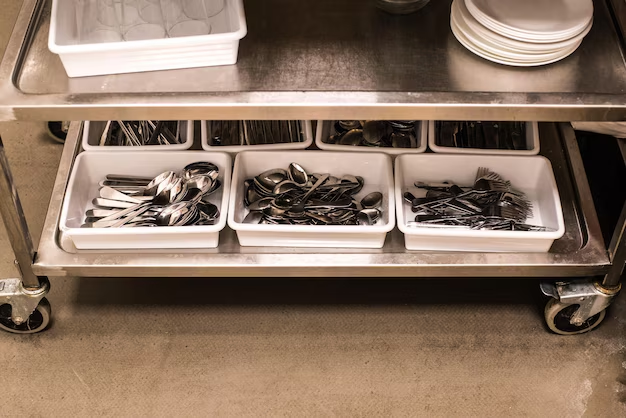How Long Do Prunes Last in the Refrigerator? Everything You Need to Know
Prunes may not be the first thing that comes to mind when thinking about long-shelf-life foods, but these sweet, chewy fruits have become a pantry staple for many. They’re not just a tasty snack; their benefits have made them a popular food for maintaining digestive health. However, like any perishable food, prunes have a shelf life that can affect their quality and safety when stored in different conditions. In this guide, we'll explore how long prunes last in the refrigerator and extend into practical storage tips, related uses, and insightful advice to empower your pantry decisions.
🕑 Are Refrigerators the Best Option for Storing Prunes?
The Basics of Storing Prunes
Storing prunes is fairly straightforward. They're typically sold dried, which gives them a much longer shelf life compared to fresh fruits. However, once their package is opened, the way you store them can markedly influence how long they remain fresh and tasty. Refrigeration stands out as one of the best options to maximize the longevity of prunes, maintaining their texture and flavor.
How Does Refrigeration Affect Prunes' Lifespan?
When you store prunes in a refrigerator, you're keeping them away from the heat and humidity that can lead to them going bad. Cold temperatures slow down the growth of bacteria and yeast which are responsible for spoilage. Generally, prunes can last up to six months in the refrigerator, with their quality upheld, as long as the environment remains dry and they are kept in airtight conditions.
🛒 Choosing the Right Prunes for Longer Shelf Life
Factors to Consider When Buying Prunes
Making an informed choice at the store can impact how well your prunes fare over time. Consider these key points:
- Check for packaging integrity: Look for sealed packaging to prevent contamination.
- Examine expiration dates: While dried, prunes do expire and should be labeled with a best-before date.
- Assess the texture and color: High-quality prunes should have a uniform, dark color and a tender, chewy texture.
🍽️ Best Practices for Storing Prunes in the Refrigerator
Optimal Storage Containers
Preserving prunes effectively revolves around limiting exposure to air, which can dry them out, and moisture, which can lead to spoilage.
- Use airtight containers or resealable plastic bags.
- Consider vacuum sealing for extra precaution, especially if you buy prunes in bulk.
Prunes Storage Summary:
- 🌡️ Temperature: Store at consistent, cool temperatures.
- 📦 Packaging: Airtight containers or vacuum-sealed bags.
- 📅 Lifespan: Up to 6 months in the refrigerator.
📉 Signs That Your Prunes May Have Passed Their Prime
Understanding when your prunes are no longer safe or optimal to eat is crucial for health and taste.
- Smell test: Prunes should have a sweet, mild scent. A sour or off smell is a giveaway they’ve spoiled.
- Texture and appearance: Watch for an unusually sticky or mushy texture, or signs of mold, which indicate they're no longer good to consume.
- Taste: Taste a small piece if they pass the smell and visual checks. If it tastes off, it's better to discard them.
🔄 Extending the Use of Your Prunes
Utilizing Prunes in Creative Ways
Prunes are versatile and can be used beyond just snacking. Here are several ideas:
- In baking: Add to muffins, bread, or oatmeal bars for a sweet touch.
- As a sweetener: Blend into smoothies or use as a sugar substitute in sauces.
- Infused in drinks: Soak prunes in liquor or juice to create flavorful cocktail additions.
Trying different uses not only helps in meal diversification but also reduces waste by ensuring prunes are consumed before they're past their best.
🛡️ Food Safety and Prunes: What You Need to Keep in Mind
Prevention Practices for Safe Consumption
While prunes generally offer a long shelf life, maintaining safe practices is essential.
- Clean Handling: Always wash hands before handling prunes.
- Separation: Store prunes separately from strong-smelling foods to prevent flavor infusion.
- Allergic Reactions: Though rare, some individuals might have sensitivities to sulfites used as preservatives in dried fruits.
📝 Quick Reference Storage Tips
For quick access, here’s a summary list of practical tips on storing prunes in the refrigerator:
🍂 Choose Wisely: Opt for prunes in sealed packages with a good texture and deep color.
🔒 Seal It Tight: Use airtight containers or vacuum-seal bags.
🌐 Limit Exposure: Keep away from moisture, heat, and strong-smelling items.
🔄 Rotate Stock: Use the oldest packages first to minimize waste.
👃 Trust Your Senses: Always check smell, texture, and taste before consuming.
🧑🍳 Get Creative: Incorporate prunes in various recipes to ensure they are utilized before expiring.
Prunes can be a fantastic addition to a balanced diet, thanks to their nutritional benefits. Proper storage will ensure they remain a delicious component of meals and snacks for months. Follow these guidelines to maintain their quality and gain the most utility from your purchase. Remember, mindful purchasing and storage are key to reducing waste and enjoying prunes at their best.

